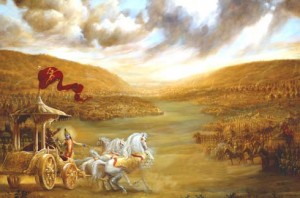Five thousand years old leadership lessons
 What has a king to teach us on Leadership ? And a King who lived more than 5000 years ago ?
What has a king to teach us on Leadership ? And a King who lived more than 5000 years ago ?
I recently spend time in India in the state of Karnataka.
On my way back, while waiting at the airport, I bought a book on leadership which I read on the plane. And I found the story told in the introduction very interesting as it manages to convey some meaningful lessons on leadership, even in its simplicity.
This is the story of the commander-in-chief of the Kauravas, named Bhishma, who fought against the Pandavas , in a battle depicted in the Mahabharata, one of the most well known Indian scripture. That battle was won by the Pandavas, and Bhishma was found dying on the battlefield. He was 116 years old, and respected by both sides.
As the Mahabharata describes it, Krishna, the divine adviser of the Pandavas, asked Bhishma to teach the Pandavas the art of leadership so that he could now rule the vast kingdom he had won in battle.
In whispers, the king said those 4 things :
- « It is not easy to rule well, and a King’s one worldly duty is to rule well. It is action that shapes destiny and not the other way around »
- « A King’s conduct should be above reproach. Self-restraint, righteousness and straight forwardness are essential for his success. He should have his passions under perfect control »
- « Self-interest is the most powerful factor in the life of everyone. No one is dear to another unless there is some gain involved »
- « His first duty is to his people. He should take care of them, with no thoughts of pleasing himself, subordinating his own wishes and desires to those of his people. He should guard them as mother guards her child »
In other words :
- People may doubt what we say but will believe what we do.
- Awareness and self-awareness are essential traits of leaders (as discussed in the 8 Critical Skills of Ecological Leadership)
- Understanding the importance of fulfilling one’s needs to keep him motivated is highly important. At the same time, the leader must be able to sublimate this weakness for himself and rise above self-interest.
- The importance of servant leadership which I have discussed in various ways in this blog.
Interestingly, very little here is said about skills or knowledge.
No that they are not important. But what the above suggests is that in the end it all comes down to the leader’s character.
The book then goes on on how to develop the necessary strength of character so that leaders can indeed act effectively.
How much would you say character is a prevailing trait of great leaders ?

Leave a Reply